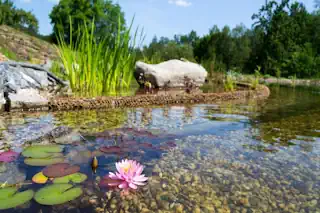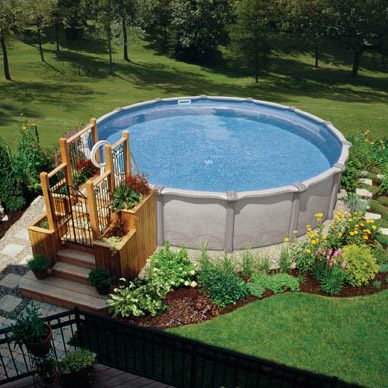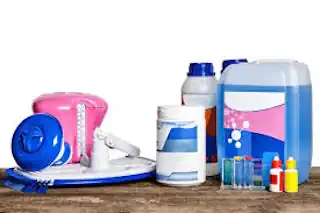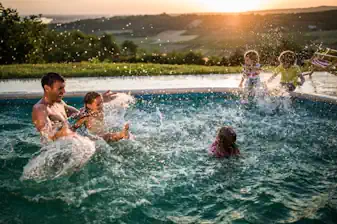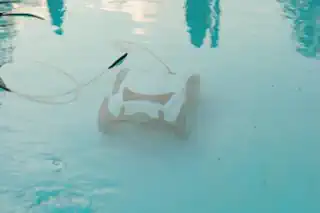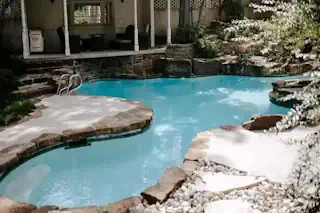A Warm Welcome to Keeping the Kids Cool: Kiddie Swimming Pools
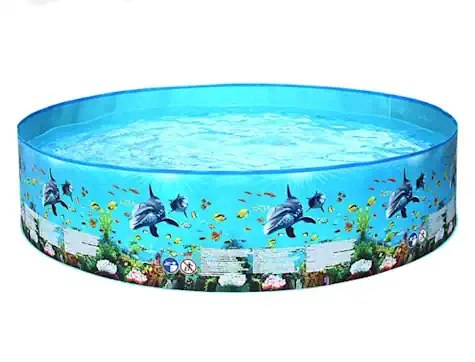
Hey there, parents and pool lovers! As summer approaches, it’s the perfect time to talk about an essential item for family fun: kiddie swimming pools! These mini oases offer more than just a cool reprieve from the heat – they can also play a vital role in your child’s development. Today, we’ll dive into the benefits of kiddie pools and share some tips to make the most of your backyard adventures.
Choosing the Right Kiddie Pool for Your Space and Child’s Age
When picking the perfect pool, consider your available space and your child’s age. Infants and toddlers will enjoy shallow, inflatable pools with fun designs, while older kids might prefer larger, more durable options for splashing and games. Don’t forget to measure your yard to ensure a comfortable fit! 📏
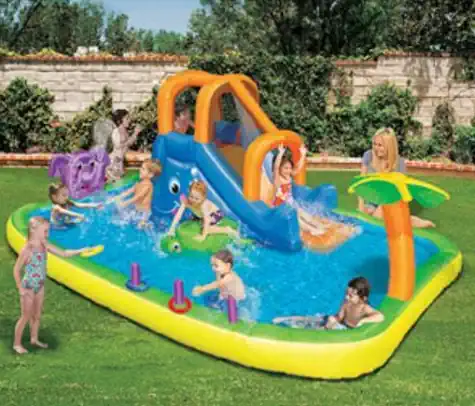
Our Top 5 Recommendations for Choosing a Kiddie Pool
Choosing the right kiddie pool can be as refreshing as a dip on a hot summer day. Here are our top 5 picks to help you find the perfect match for your little swimmer:
Splashy Sunflower Pool: Ideal for toddlers, this inflatable pool is shallow and adorned with a playful sunflower design. It’s perfect for those first splashes and introduces kids to water fun safely.
Pirate Adventure Water Play: Ahoy, mateys! Geared toward preschoolers, this pool transforms your backyard into a pirate’s paradise, complete with a slide and sprinkler. It’s great for imaginative play and active water games.
Rainbow Ring Play Center: Bright and colorful, this pool is a hit for families with multiple kids. It features a small water slide, a wading pool, and various water games. Suitable for children ages 3 and up, it encourages social play and outdoor fun.
Jungle Explorer Mini Water Park: Invite the thrill of a water park into your home! With a climbing wall, a pool base, and a slide, kids aged 5-10 can enjoy hours of dynamic play. It’s a durable choice for the adventurous spirit.
Eco-Friendly Splash Pad: For those who are conscious about water usage and safety, this splash pad offers a fantastic alternative. It’s made from non-toxic materials and provides a safe, shallow playing surface that’s perfect for all ages, encouraging eco-friendly fun under the sun.
Each of these options can offer hours of enjoyment and relief from the summer heat, while also keeping safety and development in mind. Remember, always supervise your children during water play and apply sunscreen generously to protect their delicate skin!
Safety Measures for Kiddie Pool Use
Safety always comes first! Always supervise your children when they’re in or around the pool, even if it’s shallow. Establish clear rules, such as no running or diving, and consider using a pool alarm for added peace of mind. Don’t forget the sunscreen and frequent water breaks to keep everyone happy and healthy!
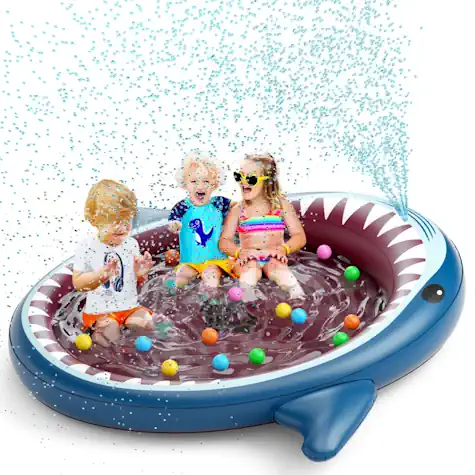
Top 10 Safety Considerations and Measures for Kiddie Pool Use
Keeping your kiddie pool experience both fun and safe is paramount. Here’s a list of the top 10 safety considerations every parent should follow:
Always Supervise: Never leave children unattended in or near the pool, not even for a second. Continuous, active supervision is crucial.
Learn CPR: Parents and guardians should be trained in CPR for children and infants. This knowledge can be life-saving in case of an emergency.
Wear Life Jackets: For non-swimmers or very young children, wearing a US Coast Guard-approved life jacket can add an extra layer of safety.
Ensure Water Hygiene: Change the pool water regularly to prevent bacteria and algae growth. Avoid using the pool if it’s not clean.
Set Clear Rules: Establish and enforce pool rules like no running, no pushing, and no jumping into shallow water.
Use Sun Protection: Apply broad-spectrum, water-resistant sunscreen on all exposed skin, and reapply as directed, especially after getting wet.
Stay Hydrated: Keep children hydrated with frequent water breaks to avoid heat exhaustion and dehydration.
Check for Hazards: Before each use, inspect the pool area for sharp objects, tripping hazards, or dangerous chemicals.
Maintain a Safe Environment: Keep the pool area fenced or covered when not in use to prevent unsupervised access by children.
Educate About Water Safety: Teach children basic water safety and swimming skills as early as possible, adapted to their age and development level.
Remember, a little preparation goes a long way in ensuring that pool time is both enjoyable and safe for everyone!
Fun and Educational Activities for Kiddie Pools
Kiddie pools offer endless opportunities for play and learning. Encourage your little ones to explore concepts like volume and buoyancy with measuring cups and floating toys. Set up a pretend car wash or host a toy boat race to spark their imagination. You can even create a mini water park with sprinklers and slides!
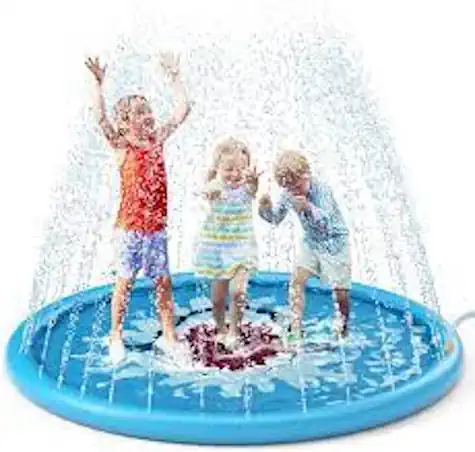
Here are our top 5 recommended fun and educational activities for kiddie pools that are sure to make a splash:
Aquatic Treasure Hunt: Hide waterproof toys or coins at the bottom of the pool and have your kids discover them. This activity is perfect for improving their diving skills and teaches them about the concept of buoyancy and weight underwater.
Water-Based Art Station: Set up a floating art station using foam boards as canvases and watercolor paints. This activity fosters creativity and shows how water affects different materials and textures.
DIY Fishing Game: Create your own fishing game by crafting fish from waterproof materials with paper clips on their mouths. Use a stick with a magnet attached as a fishing rod. It’s a fun way to develop fine motor skills and hand-eye coordination.
Mini Pool Olympics: Organize a series of mini-games such as ring toss, water balloon volleyball, or a paddle boat race. This encourages physical activity, teamwork, and a bit of friendly competition.
Scientific Water Experiments: Use the kiddie pool to conduct simple water experiments. For example, teach kids about water filtration using clean sand and rocks, or explore density by having them guess which objects will float or sink, testing their hypotheses. This introduces basic scientific principles in a fun, hands-on way.
Maintenance Tips to Keep Your Kiddie Pool Safe and Clean
Proper maintenance is key to enjoying your kiddie pool all season long. Regularly check the water quality and use appropriate treatments to prevent bacteria growth. Establish a cleaning routine, and always drain and dry the pool when not in use to avoid attracting mosquitoes or other pests. A little TLC goes a long way!
To ensure your kiddie pool remains a safe and sparkling oasis of fun, follow these essential maintenance tips:
Daily Skimming: Use a fine mesh net to remove leaves, insects, and other debris from the water each day. It keeps the pool inviting and prevents clogging up of any filtering systems.
Regular Water Changes: Depending on usage, completely replace the pool water every few days to maintain hygiene and prevent the buildup of bacteria and algae.
Disinfecting the Pool: After draining the pool, use a mild disinfectant to clean the interior surfaces. Rinse thoroughly before refilling to ensure no harmful residues are left behind.
Use of Pool Covers: When not in use, cover the kiddie pool to keep out debris, insects, and animals. A cover also reduces evaporation and helps maintain water temperature.
Check for Damage: Regularly inspect the pool for leaks, tears, or any other damage. Prompt repairs can prevent accidents and extend the life of your pool.
Store Properly: If you plan not to use the pool for an extended period, dry it completely, deflate (if applicable), and store it in a cool, dry place to avoid mold and mildew growth.
Educate on Hygiene: Teach children not to drink pool water, to rinse off before and after pool use, and to inform an adult if they’ve had an accident in the water.
Balanced Chemical Treatment: For those using slightly larger kiddie pools with filtration systems, ensure the water chemistry (pH, chlorine levels) is balanced according to manufacturer instructions or local pool safety guidelines.
Monitor Water Temperature: Avoid overheating; ensure the water is at a comfortable temperature, especially for very young children who are more sensitive to heat.
Safety Equipment: Keep safety equipment like a first aid kit and a lifebuoy near the pool area for emergency use.
By implementing these maintenance tips, you’ll not only keep the kiddie pool safe and clean for your children but will also create a more enjoyable and refreshing environment for those hot summer days.
Kiddie Pools: A Valuable Addition to Family Fun and Bonding
More than just a way to beat the heat, kiddie pools provide a fantastic opportunity for family bonding and making lasting memories. They offer a safe, controlled environment for children to explore water play and develop essential skills like coordination and confidence. Plus, they’re an affordable and convenient option for summer fun right in your own backyard! Happy splashing!
Frequently Asked Questions (FAQs)
Here are some common questions and answers that might help you get the most out of your kiddie pool experience:
What age is appropriate for a kiddie pool?
Kiddie pools are suitable for children as young as infants all the way up to about 6 years old. Always ensure that the pool’s depth is appropriate for your child’s age and swimming ability, and never leave children unsupervised, regardless of age.
How often should I change the water in kiddie pools?
It’s recommended to change the water every few days, or more frequently if the pool is used daily or becomes visibly dirty. Regular water changes help prevent the buildup of bacteria and algae. Some kiddie pools have the option to add water filters which make cleaning and chemicals quick and easy.
Can I use regular household cleaning products to clean the pool?
It’s best to avoid harsh chemicals. Use mild soap or a cleaner specifically designed for pools. Always rinse the pool thoroughly after cleaning to remove any soap or cleaner residue.
Do I need to treat kiddie pool water with chemicals?
For smaller, inflatable kiddie pools, chemical treatment is not usually necessary if you’re changing the water regularly. However, for larger pools with a filtration system, a balanced chemical treatment might be needed. Follow the manufacturer’s directions or consult a pool professional.
How can I keep the water in a kiddie pool warm?
Using a pool cover can help retain heat and keep the water at a comfortable temperature. Placing the pool in a sunny area during the day and covering it at night can also help conserve warmth. Covering above-ground pools with a tarp can help trap sunlight to warm the pools.
What safety equipment should I have on hand?
It’s wise to keep a first aid kit, a lifebuoy, and a reach pole nearby. Also, ensure children wear appropriate floatation devices if they’re not confident swimmers.
Is it safe to leave an inflatable swimming pool setup when not in use?
For safety reasons and to prevent wear and tear, it’s best to drain, clean, and store the pool according to the manufacturer’s instructions when not in use for extended periods.
How can I make learning to swim in kiddie pools more fun?
Incorporate games and activities focused on skill-building, like blowing bubbles, kicking, or using arm floats. Use positive reinforcement and make each session short and sweet to keep your child engaged and looking forward to the next.
By keeping these questions in mind, you can ensure that your kiddie pools are a source of joy and safe fun throughout the summer! Happy splashing, and treasure those magical moments with your little ones.
